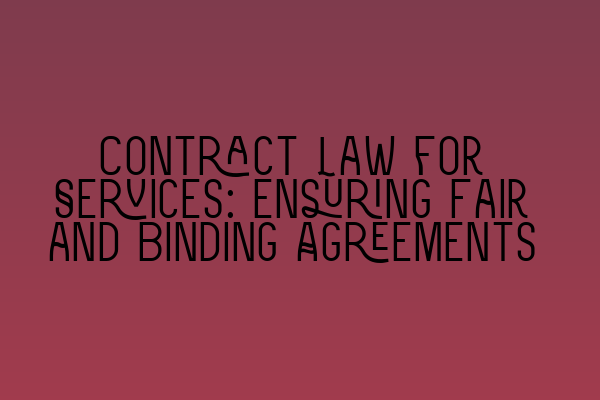Contract Law for Services: Ensuring Fair and Binding Agreements
As a solicitor, understanding contract law is essential in ensuring that your clients’ agreements are fair, binding, and enforceable. In this blog post, we will explore the fundamentals of contract law, with a specific focus on contracts for services.
The Basics of Contract Law
Before diving into the intricacies of contracts for services, let’s begin with the basics of contract law. A contract is a legally binding agreement between two or more parties that creates obligations enforceable by law. For a contract to be valid, it must meet certain key elements:
- Offer and Acceptance: There must be a clear offer made by one party and an acceptance of that offer by another party. This demonstrates the mutual consent of all involved parties.
- Consideration: Each party must provide something of value (known as consideration) in exchange for the promises made in the contract. Consideration can be in the form of money, goods, or services.
- Intention to Create Legal Relations: The parties must intend for the agreement to be legally binding. Social or domestic arrangements generally do not carry this intention.
- Legal Capacity: Each party entering into the contract must have the legal capacity to do so. This means they must be of sound mind, not under duress, and of legal age.
- Legality of Purpose: The contract must have a lawful purpose. Agreements that involve illegal activities or contravene public policy are not enforceable.
Now that we have covered the basic elements of a contract, let’s focus on the specific considerations involved in contracts for services.
Contracts for Services
Contracts for services are agreements where one party agrees to perform a service for another party in exchange for compensation. These contracts can cover a wide range of services, including professional services, such as legal or accounting work, technical services, consulting services, and more.
When drafting or reviewing a contract for services, it is crucial to consider the following key points:
- Scope of Services: Clearly define the scope of the services to be provided. Include specific details about the nature of the service, expected deliverables, timelines, and any limitations on the services.
- Payment Terms: Outline the payment terms and conditions, including the total fee, payment schedule, and any additional charges or expenses. Be explicit about late payment fees and any interest charges that may apply.
- Termination: Specify the conditions under which either party can terminate the agreement. Consider including provisions related to early termination, breach of contract, or non-performance of services.
- Intellectual Property: Address ownership and usage rights of any intellectual property created or used during the provision of services. Determine whether the client or service provider will have ownership and licensing rights.
- Confidentiality: Include provisions regarding the confidentiality of any sensitive information shared during the course of the service agreement. This helps protect the interests of both parties.
By carefully considering and addressing these key points, you can ensure that your contract for services is fair, comprehensive, and protects the rights of all parties involved.
Enforcement and Dispute Resolution
Even with a well-drafted contract, disputes may sometimes arise between parties. In such cases, it is important to have mechanisms in place to resolve conflicts and enforce the terms of the agreement.
Consider incorporating alternative dispute resolution clauses in your contract, such as mediation or arbitration, which can provide a quicker and less costly means of dispute resolution compared to traditional litigation. This can help parties reach a resolution without straining their relationship or incurring substantial legal costs.
Remember, in cases where disputes cannot be resolved through alternative means, parties may need to resort to litigation to enforce their rights under the contract. In such situations, seeking expert legal advice early on can help navigate the complexities of the legal process and protect your clients’ interests.
Stay Up to Date with Contract Law
Contract law is a dynamic field, with changes and updates happening regularly. As a solicitor, it is crucial to stay updated with the latest developments in contract law to provide the best possible advice to your clients.
If you are preparing for the SQE exam, you can enhance your knowledge and understanding of contract law through comprehensive preparation courses. Check out our SQE 2 Preparation Courses that cover contract law and other essential topics.
Additionally, to assess your understanding and practice exam-style questions, you can access our SQE 1 Practice Exam Questions and SQE 1 Practice Mocks FLK1 FLK2.
Keep an eye on the SRA SQE Exam Dates to ensure you are aware of important deadlines and can plan your preparation accordingly.
In conclusion, understanding the fundamentals of contract law is essential for solicitors dealing with contracts for services. By carefully drafting and reviewing contracts, considering key points such as scope of services, payment terms, and termination provisions, solicitors can ensure their clients’ agreements are fair, binding, and enforceable. And by staying up to date with the latest developments in contract law, solicitors can provide the best possible advice and legal support to their clients in this dynamic field.
